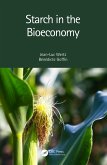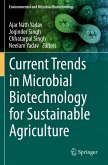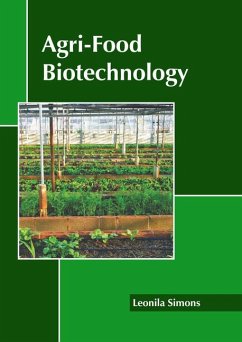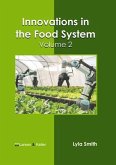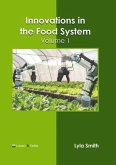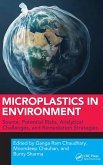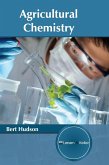Mushroom Magic
Biochemistry and Nutritional Value of Fungi
Herausgeber: Kumar, Dhirendra; Mehrotra, Sudhir; Kashyap, Shakuli; Hasan, Wajid; Sangeeta; Ansari, Mohammad Javed; Gupta, Sheetanshu
Mushroom Magic
Biochemistry and Nutritional Value of Fungi
Herausgeber: Kumar, Dhirendra; Mehrotra, Sudhir; Kashyap, Shakuli; Hasan, Wajid; Sangeeta; Ansari, Mohammad Javed; Gupta, Sheetanshu
- Gebundenes Buch
- Merkliste
- Auf die Merkliste
- Bewerten Bewerten
- Teilen
- Produkt teilen
- Produkterinnerung
- Produkterinnerung
This book presents a detailed account of mushroom biology. It covers the biochemical composition, nutritional significance, and health benefits of mushrooms. It also discusses medicinal properties, biochemical variability, and culinary techniques.
Andere Kunden interessierten sich auch für
![Starch in the Bioeconomy Starch in the Bioeconomy]() Jean-Luc WertzStarch in the Bioeconomy153,99 €
Jean-Luc WertzStarch in the Bioeconomy153,99 €![Current Trends in Microbial Biotechnology for Sustainable Agriculture Current Trends in Microbial Biotechnology for Sustainable Agriculture]() Current Trends in Microbial Biotechnology for Sustainable Agriculture193,99 €
Current Trends in Microbial Biotechnology for Sustainable Agriculture193,99 €![Agri-Food Biotechnology Agri-Food Biotechnology]() Agri-Food Biotechnology153,99 €
Agri-Food Biotechnology153,99 €![Innovations in the Food System: Volume 2 Innovations in the Food System: Volume 2]() Innovations in the Food System: Volume 2167,99 €
Innovations in the Food System: Volume 2167,99 €![Innovations in the Food System: Volume 1 Innovations in the Food System: Volume 1]() Innovations in the Food System: Volume 1167,99 €
Innovations in the Food System: Volume 1167,99 €![Microplastics in Environment Microplastics in Environment]() Microplastics in Environment155,99 €
Microplastics in Environment155,99 €![Agricultural Chemistry Agricultural Chemistry]() Agricultural Chemistry147,99 €
Agricultural Chemistry147,99 €-
-
-
This book presents a detailed account of mushroom biology. It covers the biochemical composition, nutritional significance, and health benefits of mushrooms. It also discusses medicinal properties, biochemical variability, and culinary techniques.
Hinweis: Dieser Artikel kann nur an eine deutsche Lieferadresse ausgeliefert werden.
Hinweis: Dieser Artikel kann nur an eine deutsche Lieferadresse ausgeliefert werden.
Produktdetails
- Produktdetails
- Verlag: CRC Press
- Seitenzahl: 350
- Erscheinungstermin: 6. Dezember 2024
- Englisch
- Abmessung: 234mm x 156mm x 21mm
- Gewicht: 680g
- ISBN-13: 9781032943459
- ISBN-10: 1032943459
- Artikelnr.: 71614536
- Herstellerkennzeichnung
- Libri GmbH
- Europaallee 1
- 36244 Bad Hersfeld
- gpsr@libri.de
- Verlag: CRC Press
- Seitenzahl: 350
- Erscheinungstermin: 6. Dezember 2024
- Englisch
- Abmessung: 234mm x 156mm x 21mm
- Gewicht: 680g
- ISBN-13: 9781032943459
- ISBN-10: 1032943459
- Artikelnr.: 71614536
- Herstellerkennzeichnung
- Libri GmbH
- Europaallee 1
- 36244 Bad Hersfeld
- gpsr@libri.de
Sheetanshu Gupta is alumnus of G.B. Pant University of Agriculture and Technology, Pantnagar, Uttarakhand, India and works in the field of Biochemistry, Molecular Biology, and Biotechnology. He specializes in environmental problems, aeroponics and hydroponics, and protein biochemistry. He is also involved in innovating farming techniques and exploring novel approaches to plant protection. Dhirendra Kumar is Assistant Professor in the Department of Botany and Assistant Nodal Officer IPR Cell at Chaudhary Bansi Lal University, Haryana, India. His areas of interest are Plant Biology, Biotechnology, Bioprocess Development, Termite Biology, and Waste Management and he is currently working on green synthesis plants and metal-based nanomaterials. Wajid Hasan is Subject Matter Specialist in Entomology at KVK Jehanabad, Bihar Agricultural University in Bihar, India. He holds a doctorate in Agricultural Entomology from GB Pant University of Agriculture and Technology, Pantnagar, Uttarakhand, India and is devoted to researcher and extension activities in the field. Sangeeta is Assistant Professor, Home Science (Food & Nutrition) at Ramabai Govt. Women Post Graduate College, Ambedkarnagar, Uttar Pradesh, India. She holds 13 years of teaching experience and has published many papers in national and international journals. Mohammad Javed Ansari is Assistant Professor in the Department of Botany at Hindu College, Moradabad, Uttar Pradesh, India. He holds a Ph.D. in Biotechnology from IIT Roorkee, India and has served as Assistant Professor at King Saud University, Riyadh, Saudi Arabia. Shakuli Kashyap is Assistant Professor at the College of Agriculture Sciences, Teerthanker Mahaveer University, Moradabad, India. She holds a Ph.D. in Botany from G. B. P. U. A. & T, Pantnagar, India. Sudhir Mehrotra is Professor at Lucknow University, Uttar Pradesh, India. He holds 32 years of teaching experience and has completed several research projects working in the field of Biochemical Toxicology.
Preface
About the Editors
1. Mushroom Diversity and their Biochemical Composition
2. Nutritional Significance of Mushrooms in Human Diets
3. Phenolic Compounds and Antioxidant Potential in Mushrooms
4. Terpenoids and Their Health Benefits in Edible Fungi
5. Protein and Amino Acid Profile of Mushrooms
6. Vitamins and Minerals in Mushrooms: A Nutritional Treasure
7. ß-Glucans in Mushrooms: Immunomodulatory and Anticancer Effects
8. Chitin and Chitosan in Mushrooms: Bioactivity and Applications
9. Medicinal Properties of Edible Mushrooms: A Biochemical Perspective
10. Mushrooms as Sources of Natural Bioactive Compounds
11. Impact of Cooking and Processing on Mushroom Nutrient Retention
12. Culinary Techniques for Maximizing Nutritional Value of Mushrooms
13. Mushrooms and Gut Health: Interactions with the Microbiome
14. Prebiotic Potential of Mushroom-Derived Compounds
15. Biochemical Variability in Wild vs. Cultivated Mushrooms
16. Edible and Wild Medicinal Mushrooms: Comparative Biochemical Profiles
17. Allergenic and Toxic Compounds in Mushrooms: Biochemical Identification
and Implications
18. Mushrooms as Bioindicators of Environmental Toxins
19. Mushrooms as Functional Foods: Trends and Innovations
20. Integrating Mushroom Nutritional Biochemistry into Human Health
Strategies
21. An Update on Pathophysiology and Management of Mushroom Mycetism
About the Editors
1. Mushroom Diversity and their Biochemical Composition
2. Nutritional Significance of Mushrooms in Human Diets
3. Phenolic Compounds and Antioxidant Potential in Mushrooms
4. Terpenoids and Their Health Benefits in Edible Fungi
5. Protein and Amino Acid Profile of Mushrooms
6. Vitamins and Minerals in Mushrooms: A Nutritional Treasure
7. ß-Glucans in Mushrooms: Immunomodulatory and Anticancer Effects
8. Chitin and Chitosan in Mushrooms: Bioactivity and Applications
9. Medicinal Properties of Edible Mushrooms: A Biochemical Perspective
10. Mushrooms as Sources of Natural Bioactive Compounds
11. Impact of Cooking and Processing on Mushroom Nutrient Retention
12. Culinary Techniques for Maximizing Nutritional Value of Mushrooms
13. Mushrooms and Gut Health: Interactions with the Microbiome
14. Prebiotic Potential of Mushroom-Derived Compounds
15. Biochemical Variability in Wild vs. Cultivated Mushrooms
16. Edible and Wild Medicinal Mushrooms: Comparative Biochemical Profiles
17. Allergenic and Toxic Compounds in Mushrooms: Biochemical Identification
and Implications
18. Mushrooms as Bioindicators of Environmental Toxins
19. Mushrooms as Functional Foods: Trends and Innovations
20. Integrating Mushroom Nutritional Biochemistry into Human Health
Strategies
21. An Update on Pathophysiology and Management of Mushroom Mycetism
Preface
About the Editors
1. Mushroom Diversity and their Biochemical Composition
2. Nutritional Significance of Mushrooms in Human Diets
3. Phenolic Compounds and Antioxidant Potential in Mushrooms
4. Terpenoids and Their Health Benefits in Edible Fungi
5. Protein and Amino Acid Profile of Mushrooms
6. Vitamins and Minerals in Mushrooms: A Nutritional Treasure
7. ß-Glucans in Mushrooms: Immunomodulatory and Anticancer Effects
8. Chitin and Chitosan in Mushrooms: Bioactivity and Applications
9. Medicinal Properties of Edible Mushrooms: A Biochemical Perspective
10. Mushrooms as Sources of Natural Bioactive Compounds
11. Impact of Cooking and Processing on Mushroom Nutrient Retention
12. Culinary Techniques for Maximizing Nutritional Value of Mushrooms
13. Mushrooms and Gut Health: Interactions with the Microbiome
14. Prebiotic Potential of Mushroom-Derived Compounds
15. Biochemical Variability in Wild vs. Cultivated Mushrooms
16. Edible and Wild Medicinal Mushrooms: Comparative Biochemical Profiles
17. Allergenic and Toxic Compounds in Mushrooms: Biochemical Identification
and Implications
18. Mushrooms as Bioindicators of Environmental Toxins
19. Mushrooms as Functional Foods: Trends and Innovations
20. Integrating Mushroom Nutritional Biochemistry into Human Health
Strategies
21. An Update on Pathophysiology and Management of Mushroom Mycetism
About the Editors
1. Mushroom Diversity and their Biochemical Composition
2. Nutritional Significance of Mushrooms in Human Diets
3. Phenolic Compounds and Antioxidant Potential in Mushrooms
4. Terpenoids and Their Health Benefits in Edible Fungi
5. Protein and Amino Acid Profile of Mushrooms
6. Vitamins and Minerals in Mushrooms: A Nutritional Treasure
7. ß-Glucans in Mushrooms: Immunomodulatory and Anticancer Effects
8. Chitin and Chitosan in Mushrooms: Bioactivity and Applications
9. Medicinal Properties of Edible Mushrooms: A Biochemical Perspective
10. Mushrooms as Sources of Natural Bioactive Compounds
11. Impact of Cooking and Processing on Mushroom Nutrient Retention
12. Culinary Techniques for Maximizing Nutritional Value of Mushrooms
13. Mushrooms and Gut Health: Interactions with the Microbiome
14. Prebiotic Potential of Mushroom-Derived Compounds
15. Biochemical Variability in Wild vs. Cultivated Mushrooms
16. Edible and Wild Medicinal Mushrooms: Comparative Biochemical Profiles
17. Allergenic and Toxic Compounds in Mushrooms: Biochemical Identification
and Implications
18. Mushrooms as Bioindicators of Environmental Toxins
19. Mushrooms as Functional Foods: Trends and Innovations
20. Integrating Mushroom Nutritional Biochemistry into Human Health
Strategies
21. An Update on Pathophysiology and Management of Mushroom Mycetism


